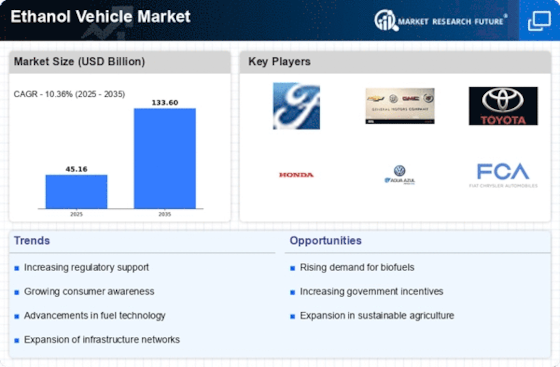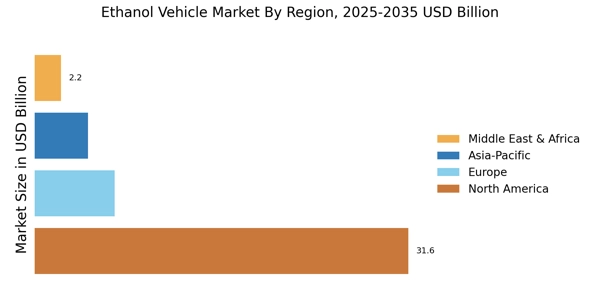Rising Fuel Prices
The Ethanol Vehicle Market is also influenced by the volatility of fuel prices. As crude oil prices fluctuate, consumers are increasingly looking for cost-effective alternatives. Ethanol, often produced domestically, can provide a more stable pricing structure compared to gasoline. In recent years, the price of ethanol has been competitive, making it an attractive option for budget-conscious consumers. For instance, in 2023, the average price of ethanol was reported to be significantly lower than that of gasoline, which encouraged more consumers to consider ethanol vehicles. This economic factor is likely to continue driving the Ethanol Vehicle Market as consumers seek to mitigate the impact of rising fuel costs.
Government Regulations and Support
Government regulations and support are pivotal in the growth of the Ethanol Vehicle Market. Many countries have implemented policies that promote the use of renewable fuels, including ethanol. These policies often include tax incentives, subsidies, and mandates for blending ethanol with gasoline. For instance, the Renewable Fuel Standard in certain regions requires a specific volume of renewable fuel to be blended into the fuel supply. Such regulations not only encourage the production and consumption of ethanol but also create a favorable market environment for ethanol vehicles. As governments continue to prioritize energy independence and environmental sustainability, the Ethanol Vehicle Market is likely to benefit from ongoing regulatory support.
Consumer Demand for Alternative Fuels
The Ethanol Vehicle Market is experiencing a surge in consumer demand for alternative fuels. As individuals become more environmentally conscious, there is a noticeable shift towards vehicles that utilize renewable energy sources. Ethanol, being a widely available alternative, is gaining traction among consumers who are looking for ways to reduce their carbon footprint. Surveys indicate that a significant percentage of consumers are willing to pay a premium for vehicles that run on alternative fuels, including ethanol. This growing demand is likely to drive manufacturers to invest more in the development of ethanol vehicles, thereby propelling the Ethanol Vehicle Market forward.
Environmental Concerns and Sustainability
The Ethanol Vehicle Market is increasingly driven by growing environmental concerns. As awareness of climate change and air pollution rises, consumers and governments alike are seeking sustainable alternatives to fossil fuels. Ethanol, derived from renewable resources, presents a cleaner option that can significantly reduce greenhouse gas emissions. In fact, studies indicate that ethanol can reduce carbon dioxide emissions by up to 40% compared to traditional gasoline. This shift towards sustainability is not merely a trend; it is becoming a necessity as countries commit to stricter environmental regulations. Consequently, the Ethanol Vehicle Market is likely to experience robust growth as more consumers opt for vehicles that align with their environmental values.
Technological Innovations in Ethanol Production
Technological advancements in the production of ethanol are playing a crucial role in shaping the Ethanol Vehicle Market. Innovations such as improved fermentation processes and the development of cellulosic ethanol are enhancing the efficiency and sustainability of ethanol production. These advancements not only lower production costs but also increase the yield of ethanol from various feedstocks. For example, the introduction of genetically modified organisms has been shown to enhance the fermentation process, leading to higher ethanol output. As these technologies continue to evolve, they are expected to bolster the Ethanol Vehicle Market by making ethanol a more viable and attractive fuel option for consumers.

















